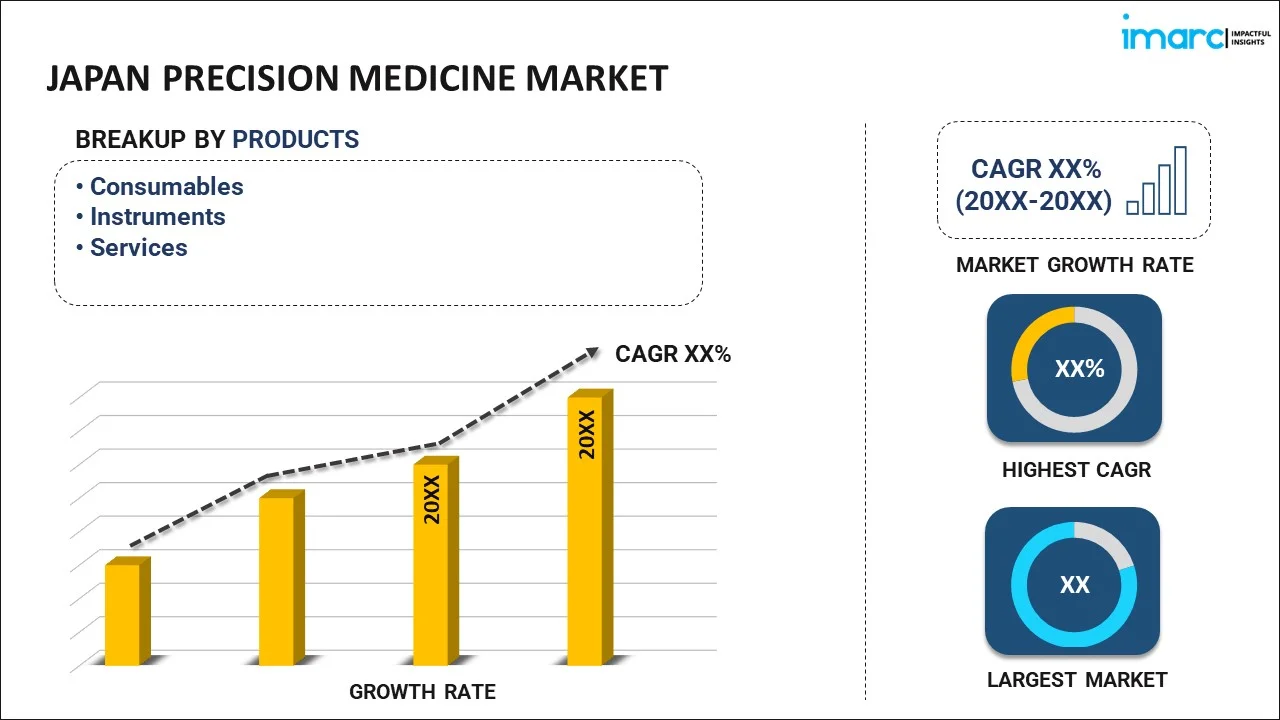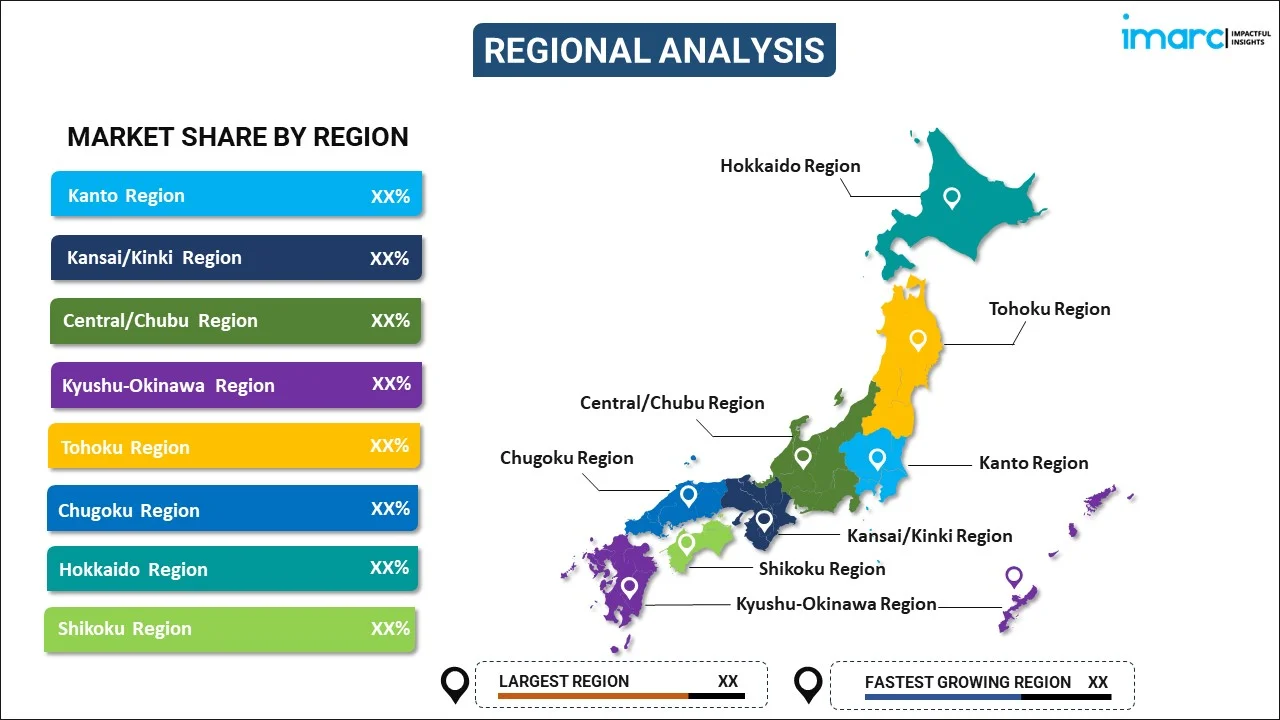
Japan Precision Medicine Market Report by Product (Consumables, Instruments, Services), Technology (Big Data Analytics, Bioinformatics, Gene Sequencing, Drug Discovery, Companion Diagnostics, and Others), Application (Oncology, Central Nervous System (CNS), Immunology, Respiratory Medicine, Infections, and Others), End User (Hospitals and Clinics, Diagnostic Centers, Pharma and Biotech Companies, Healthcare IT Firms, and Others), and Region 2026-2034
Market Overview:
Japan precision medicine market size reached USD 5,088.0 Million in 2025. Looking forward, IMARC Group expects the market to reach USD 7,600.5 Million by 2034, exhibiting a growth rate (CAGR) of 4.56% during 2026-2034. The increasing demand for telemedicine and remote monitoring technologies, which allow for continuous data collection and analysis, thereby enabling healthcare providers to make real-time adjustments to treatment plans based on individual patient data, is primarily driving the market.
|
Report Attribute
|
Key Statistics
|
|---|---|
|
Base Year
|
2025 |
|
Forecast Years
|
2026-2034
|
|
Historical Years
|
2020-2025
|
| Market Size in 2025 | USD 5,088.0 Million |
| Market Forecast in 2034 | USD 7,600.5 Million |
| Market Growth Rate (2026-2034) | 4.56% |
Precision medicine refers to an innovative healthcare approach that tailors medical treatment and interventions to individual patients based on their unique environmental, genetic, and lifestyle factors. Unlike traditional one-size-fits-all approaches, precision medicine recognizes that each person's genetic makeup and life circumstances are distinct. By analyzing a person's genetic profile and other relevant data, healthcare providers can make more accurate diagnoses, predict disease risk, and personalize treatment plans. This approach allows for treatments that are not only more effective but also potentially safer, as they minimize adverse effects. Precision medicine has shown promising results in various medical fields, such as oncology, where targeted therapies can be designed to specifically combat cancer cells while sparing healthy tissue. It also has applications in areas like cardiology, neurology, and psychiatry, helping to optimize treatments for ailments ranging from heart disease to mental health disorders. Ultimately, precision medicine aims to revolutionize healthcare by delivering tailored, efficient, and patient-centered solutions that improve outcomes and quality of life.
Japan Precision Medicine Market Trends:
The precision medicine in Japan is rapidly gaining momentum in the healthcare industry. Several drivers are propelling its growth. Firstly, advancements in genomics and biotechnology have paved the way for a deeper understanding of the genetic basis of diseases. This knowledge has enabled the development of targeted therapies, leading to improved patient outcomes. Moreover, the increasing incidence of chronic diseases in Japan is a significant driver. Precision medicine offers the promise of more efficacious treatments and better disease management, potentially reducing the burden on healthcare systems. Additionally, government initiatives and funding support for precision medicine R&D are playing a pivotal role. Policymakers recognize the potential of precision medicine to reduce healthcare costs and improve patient care, leading to increased investments in this field. Apart from this, the inflating application of big data and advanced analytics tools with the integration of electronic health records, genomic data, and clinical information that allow for more precise diagnosis and treatment recommendations is expected to drive the precision medicine in Japan during the forecast period.
Japan Precision Medicine Market Segmentation:
IMARC Group provides an analysis of the key trends in each segment of the market, along with forecasts at the country level for 2026-2034. Our report has categorized the market based on product, technology, application, and end user.
Product Insights:

- Consumables
- Instruments
- Services
The report has provided a detailed breakup and analysis of the market based on the product. This includes consumables, instruments, and services.
Technology Insights:
- Big Data Analytics
- Bioinformatics
- Gene Sequencing
- Drug Discovery
- Companion Diagnostics
- Others
A detailed breakup and analysis of the market based on the technology have also been provided in the report. This includes big data analytics, bioinformatics, gene sequencing, drug discovery, companion diagnostics, and others.
Application Insights:
- Oncology
- Central Nervous System (CNS)
- Immunology
- Respiratory Medicine
- Infections
- Others
The report has provided a detailed breakup and analysis of the market based on the application. This includes oncology, central nervous system (CNS), immunology, respiratory medicine, infections, and others.
End User Insights:
- Hospitals and Clinics
- Diagnostic Centers
- Pharma and Biotech Companies
- Healthcare IT Firms
- Others
A detailed breakup and analysis of the market based on the end user have also been provided in the report. This includes hospitals and clinics, diagnostic centers, pharma and biotech companies, healthcare IT firms, and others.
Regional Insights:

- Kanto Region
- Kansai/Kinki Region
- Central/ Chubu Region
- Kyushu-Okinawa Region
- Tohoku Region
- Chugoku Region
- Hokkaido Region
- Shikoku Region
The report has also provided a comprehensive analysis of all the major regional markets, which include Kanto Region, Kansai/Kinki Region, Central/ Chubu Region, Kyushu-Okinawa Region, Tohoku Region, Chugoku Region, Hokkaido Region, and Shikoku Region.
Competitive Landscape:
The market research report has also provided a comprehensive analysis of the competitive landscape in the market. Competitive analysis such as market structure, key player positioning, top winning strategies, competitive dashboard, and company evaluation quadrant has been covered in the report. Also, detailed profiles of all major companies have been provided.
Japan Precision Medicine Market Report Coverage:
| Report Features | Details |
|---|---|
| Base Year of the Analysis | 2025 |
| Historical Period | 2020-2025 |
| Forecast Period | 2026-2034 |
| Units | Million USD |
| Scope of the Report | Exploration of Historical Trends and Market Outlook, Industry Catalysts and Challenges, Segment-Wise Historical and Future Market Assessment:
|
| Products Covered | Consumables, Instruments, Services |
| Technologies Covered | Big Data Analytics, Bioinformatics, Gene Sequencing, Drug Discovery, Companion Diagnostics, Others |
| Applications Covered | Oncology, Central Nervous System (CNS), Immunology, Respiratory Medicine, Infections, Others |
| End Users Covered | Hospitals and Clinics, Diagnostic Centers, Pharma and Biotech Companies, Healthcare IT Firms, Others |
| Regions Covered | Kanto Region, Kansai/Kinki Region, Central/ Chubu Region, Kyushu-Okinawa Region, Tohoku Region, Chugoku Region, Hokkaido Region, Shikoku Region |
| Customization Scope | 10% Free Customization |
| Post-Sale Analyst Support | 9-11 Weeks |
| Delivery Format | PDF and Excel through Email (We can also provide the editable version of the report in PPT/Word format on special request) |
Key Questions Answered in This Report:
- How has the Japan precision medicine market performed so far and how will it perform in the coming years?
- What has been the impact of COVID-19 on the Japan precision medicine market?
- What is the breakup of the Japan precision medicine market on the basis of product?
- What is the breakup of the Japan precision medicine market on the basis of technology?
- What is the breakup of the Japan precision medicine market on the basis of application?
- What is the breakup of the Japan precision medicine market on the basis of end user?
- What are the various stages in the value chain of the Japan precision medicine market?
- What are the key driving factors and challenges in the Japan precision medicine?
- What is the structure of the Japan precision medicine market and who are the key players?
- What is the degree of competition in the Japan precision medicine market?
Key Benefits for Stakeholders:
- IMARC’s industry report offers a comprehensive quantitative analysis of various market segments, historical and current market trends, market forecasts, and dynamics of the Japan precision medicine market from 2020-2034.
- The research report provides the latest information on the market drivers, challenges, and opportunities in the Japan precision medicine market.
- Porter's five forces analysis assist stakeholders in assessing the impact of new entrants, competitive rivalry, supplier power, buyer power, and the threat of substitution. It helps stakeholders to analyze the level of competition within the Japan precision medicine industry and its attractiveness.
- Competitive landscape allows stakeholders to understand their competitive environment and provides an insight into the current positions of key players in the market.
Need more help?
- Speak to our experienced analysts for insights on the current market scenarios.
- Include additional segments and countries to customize the report as per your requirement.
- Gain an unparalleled competitive advantage in your domain by understanding how to utilize the report and positively impacting your operations and revenue.
- For further assistance, please connect with our analysts.
 Request Customization
Request Customization
 Speak to an Analyst
Speak to an Analyst
 Request Brochure
Request Brochure
 Inquire Before Buying
Inquire Before Buying




.webp)




.webp)












